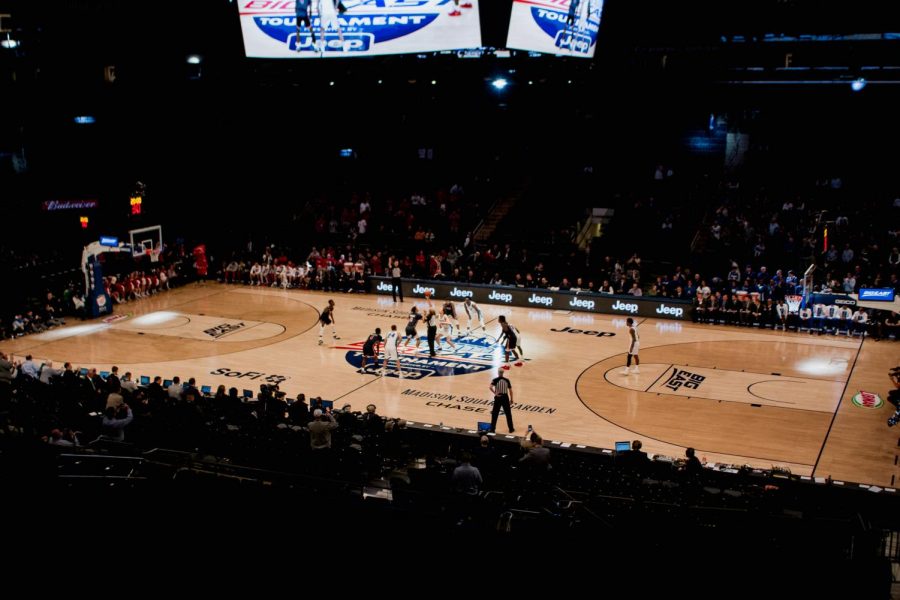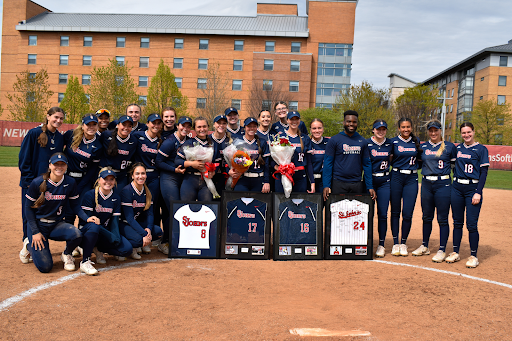For an athlete, there is nothing like walking into a warehouse-sized weight room filled with rows of newly-equipped barbells, benches, squat racks, plates and dumbbells. Likewise, there is nothing like the smell of fresh buffet-style food, lined up ready to fuel them for their practices and matchups. To top it all off, the sight of new “March Madness” gear, soap, hair products, Lysol wipes and deodorant lying across their hotel beds just adds to the excitement of the NCAA tournament during a pandemic.
“March Madness” is a college basketball athlete’s dream, making them feel like there are no problems in the world – of course, other than the sexism within the whole ordeal.
On Friday, March 19, the sexism within the NCAA was revealed by women athletes. Across social media, many athletes and coaches posted pictures of the single rack of dumbbells only going up to 30 pounds, a plastic container of cafeteria-like food and their “swag bags,” which only consisted of nearly a third of what the Men’s teams received.
“Let me put it on Twitter too ‘cause this needs the attention,” Oregon Women’s Basketball player Sedona Prince tweeted, linking to a TikTok that went viral.
Prince’s tweet truly brought the madness to March, yet this was not quite the kind that the NCAA was initially looking for. Within minutes, social media platforms were flooded with posts about the problem, from supportive efforts all the way to recognizing what the NCAA deliberately ignored: Title IX.
According to the NCAA website, Title IX is applied to athletics in three particular ways, one of which includes the following: “Other benefits: Title IX requires the equal treatment of female and male student-athletes in the provisions of: (a) equipment and supplies; (b) scheduling of games and practice times; (c) travel and daily allowance/per diem; (d) access to tutoring; (e) coaching, (f) locker rooms, practice and competitive facilities; (g) medical and training facilities and services; (h) housing and dining facilities and services; (i) publicity and promotions; (j) support services and (k) recruitment of student-athletes.”
After last week’s disparities were brought to the attention of the general public, it called into question how Title IX really plays a role in the NCAA’s inclusion efforts. Their website lays out its purposes, yet their actions, highlighted this week, do not reflect such words. Where was the “equal treatment” in equipment, locker rooms, practice facilities, competitive facilities, training facilities and dining facilities? Nowhere — as if the NCAA forgot women were a part of the tournament at all.
The misogynistic events that occurred last week were not the first instance of inequality that has been seen in the tournament.
“March Madness” is rooted in these gender disparities across the board in the NCAA. Type “March Madness” into your Google search bar, and what comes up? The NCAA Men’s Basketball Tournament – not Women’s.
“March Madness” is plastered all over the courts, broadcastings and advertisements for Men’s Basketball. It is written all over their names and faces during the month of March. At the same exact time, all the women get is “NCAA Women’s Basketball” on their court – and sometimes, they don’t even get that.
The NCAA has used the term “March Madness” to turn their Men’s Basketball program into a money-making business, leaving women in the shadows, which unfortunately is not a surprise to many.
Notre Dame Women’s Basketball Head Coach Muffett McGraw sent out a tweet on March 20, emphasizing that the news of the disparities “is hardly breaking news.”
“[Women] have been fighting this battle for years and frankly, I’m tired of it,” McGraw wrote in the same tweet. “What bothers me is that no one on the NCAA’s leadership team even noticed.”
It wasn’t until the NCAA was publicly shamed for their sexism that they recognized what was wrong with their treatment to the women in their league.
“I want to be really clear,” NCAA President Mark Emmert said in a media press conference on Friday. “This is not something that should have happened and, should we ever conduct a tournament like this again, will ever happen again.”
On top of this apology, upgrades were made to the women’s weight room facilities by the NCAA, including more space, heavier weights, squat racks, benches, resistance bands and exercise balls. These upgrades followed after larger brands, like Dick’s Sporting Goods and Orangetheory Fitness, demonstrated support for the Women’s Basketball players.
The disparities that led to this needed upgrade and support are the problem, however. As an organization that leads college sports, the NCAA must begin to show actions that reflect in what their Title IX regulations say.
To all the fans filling out their “March Madness” brackets: Think of the singularity that is present in only celebrating and betting on the men’s teams who made it to the tournament. To the NCAA: Think about the message you are sending female athletes and in general, women in sports.
Of course, the fight for equality is not to take away from the men’s teams’ successes, but to bring forth the deserved and well-overdue celebrations for the women who fight for their place not only in the tournament but also in the sports industry as a whole.
March is not only a time when college basketball athletes get to prove what they have been building all season, but it is also the month when we celebrate women across the nation during Women’s History Month. This year, we celebrate the women who were brave enough to step up and speak out on the inequalities they face as members of the NCAA. Hopefully, next year, we will be celebrating their accomplishments within “March Madness” and not just the Women’s Basketball NCAA Tournament.

















